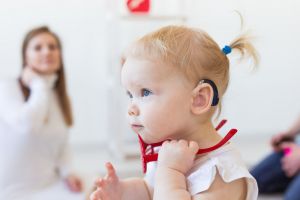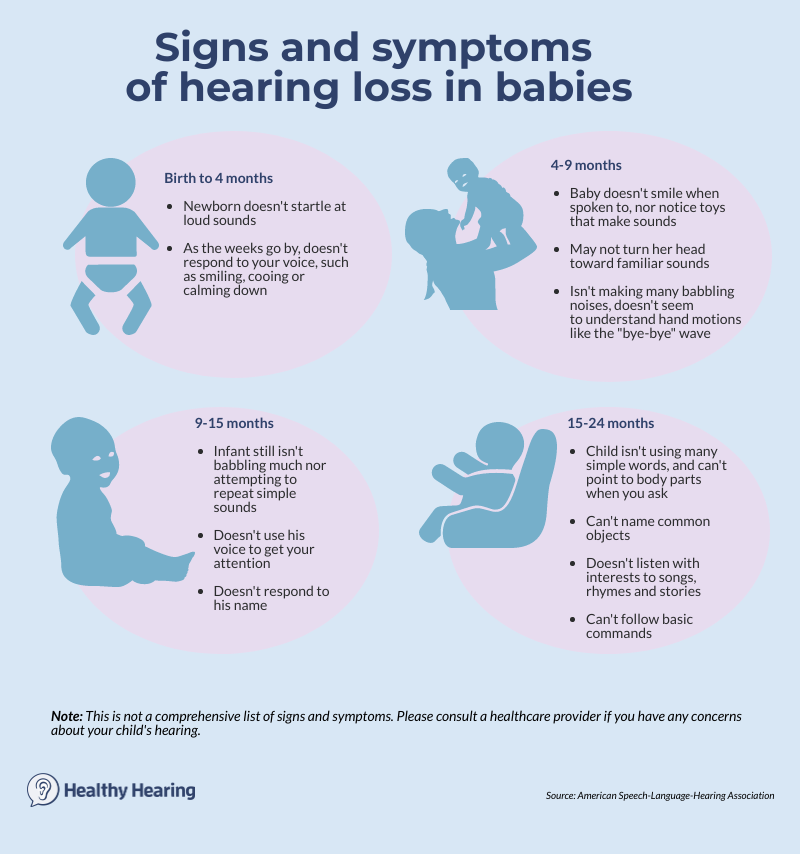|
www.HealthyHearing.com |
Hearing loss in babies and infantsEven babies just a few months old can—and should—wear hearing aids
Contributed by Joy Victory, managing editor, Healthy Hearing Hearing loss is one of the most common health conditions in the United States, and it affects all age groups, including infants. This kind of hearing loss is known as "pre-lingual" since it occurs before a child learns to speak. 
are often recommended to help with language development. Untreated hearing loss at such a young age can have serious impacts on a child's language development. Studies show it even affects infant babble. But, fortunately, nearly all infants can have their hearing loss treated, whether that be with hearing aids, cochlear implants or another treatment. Infant hearing loss: How common is it?Thanks to national newborn hearing screenings, we know that nearly 2 out of every 1,000 babies born in the U.S. have hearing loss. According to childhood hearing loss statistics from the CDC, there is a wide range of what type of hearing loss children may be born with, as well as the severity. Premature babies are more prone to hearing loss, as well, according to the March of Dimes. Symptoms of infant hearing lossThese are the common hearing loss milestones to keep an eye on:
From birth to four months, your infant should:
From four months to nine months, your infant should:
For more on what to expect as your baby grows, read our page on childhood hearing loss. What causes infant hearing loss?Most cases of infant hearing loss can be attributed to three causes:
GeneticsGenetics are thought to be responsible for between 50 and 60 percent of infant hearing loss cases, according to various sources. Many times a child with profound hearing loss is born to parents with normal hearing, indicating that a recessive gene in one or both parents is responsible. Some of these diseases may be detected as part of genetic screening during pregnancy. InfectionsMany different infections are known to cause hearing loss, but of biggest concern to newborn babies is cytomegalovirus (CMV). It is the most common non-inherited cause of hearing loss in children, according to research on CMV and hearing loss from the CDC. If a pregnant woman has CMV, the virus can be passed from mother to infant. Because a woman who has CMV while pregnant will have an infant who is at high risk of hearing loss, it is a good idea for an expectant mother to request a blood test if she is showing symptoms of a mononucleosis or flu-like illness. Infants identified as high risk can then be referred for early assessment, diagnosis and treatment. CMV isn’t the only viral infection that puts infants at risk of hearing loss. Toxoplasmosis, syphilis, German measles (rubella) and herpes all carry a high risk of newborn hearing loss if the mother has had an infection while pregnant. Later, infections like mumps can damage hearing, particularly if a child isn't vaccinated. Good prenatal care—in addition to being current on all vaccinations—can make a tremendous difference in reducing some of these risk factors. Proper prenatal care also reduces the possibility of low birth weight and premature birth, two other risk factors for newborn hearing loss. Medication side effectsTo protect an unborn baby’s health, certain medications should be avoided during pregnancy, or only used under a doctor’s close supervision. That's because they can be ototoxic—meaning, harmful to a baby's hearing. There are at least 200 ototoxic drugs linked to hearing loss and tinnitus. One example is aminoglycosides, a class of antibiotics often given to babies for birth complications or infections such as pneumonia. While lifesaving for many sick or premature infants, it is estimated that anywhere from 20 to 60 percent of infants who receive these antibiotics suffer partial or complete hearing loss. Treating hearing loss in babiesAfter a thorough assessment, your hearing care provider will recommend treatment. For most infants with hearing loss, this will be a pediatric hearing aid. Yes, even babies as young as a few months can wear hearing aids.
In some cases, a cochlear implant or bone-anchored hearing system will be recommended instead, likely when the child is a little bit older. Do babies with hearing loss or deafness babble?Babbling is a normal stage of language development among babies. Babies with hearing loss tend to babble less, which can be an early warning sign they aren't hearing well. When looking at 16 infants with profound hearing loss and 27 infants with typical hearing, researchers at the University of Missouri published a study on baby babbling that found that babies with profound hearing loss rarely make the repetitive vowel sounds, “da-da”, “ma-ma” and “ga-ga”, for example, that are common among babies without hearing loss. The good news, however, is that the MU researchers found that once the infants received cochlear implants they began babbling with the same frequency as typically hearing infants within just a few months. Cochlear implants are small electronic devices embedded behind the ear that serve to replace some functions of the impaired inner ear. Researchers noted that not only was there an increase in vocalizations with repetitive syllables, but that the number of repetitions in the string also increased. The impact of infant hearing loss on the familyAlong with stress, families are likely to experience a roller coaster of emotions, from sadness to fear and ultimately acceptance. After all, hearing loss affects every member of the family, as families are inherently communication-based. Thus experts recommend a family-centered intervention for the highest level of success and emphasize creating an environment of learning and socialization as early as possible, preferably by about six months of age. Mandatory screening, diagnosis and intervention are the key to language development for infants with hearing loss, allowing them to develop language skills comparable with other children their age by about 1st grade. The good news is that 47 states and the District of Columbia now mandate newborn hearing screening. The possibility of earlier diagnosis, better technology, greater medical advances,and more resources than ever before promise to make life easier for babies with hearing loss, as well as their families. Joy Victory, managing editor, Healthy Hearing
|
Featured clinics near me
Hearing Health Solutions from Ohio ENT - Columbus
974 Bethel Rd Ste B
Columbus, OH 43214
Earzlink Hearing Care - Reynoldsburg
7668 Slate Ridge Blvd
Reynoldsburg, OH 43068

Find a clinic
We have more hearing clinic reviews than any other site!



 Joy Victory has extensive experience editing consumer health information. Her training in particular has focused on how to best communicate evidence-based medical guidelines and clinical trial results to the public. She strives to make health content accurate, accessible and engaging to the public.
Joy Victory has extensive experience editing consumer health information. Her training in particular has focused on how to best communicate evidence-based medical guidelines and clinical trial results to the public. She strives to make health content accurate, accessible and engaging to the public.